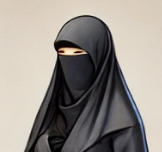Switzerland is ready to implement a nationwide “burqa ban” on January 1, 2025.
This law will prohibit facial coverings in public spaces, marking a significant move that has stirred up debate and criticism since it was first introduced.
The Federal Council has announced that any individual caught wearing a face-covering in public could face a fine of up to 1,000 Swiss francs, approximately $1,144.
The law, commonly known as the “burqa ban,” was passed narrowly through a referendum in 2021.
According to Reuters, the Swiss government clarified the rules, specifying situations where face coverings will still be allowed.
One key exemption includes airplanes and consular or diplomatic premises, where the ban will not be enforced.
People are also permitted to cover their faces in places of worship or other sacred sites, respecting religious practices in those specific areas.
There are additional exceptions for health and safety reasons, such as masks for medical purposes, which became common during the COVID-19 pandemic.
Traditional customs may allow for face coverings as well, reflecting Switzerland’s consideration for cultural heritage.
The government has also indicated that face coverings will be permitted for artistic or entertainment purposes, as well as for advertising.
In cases related to freedom of expression and assembly, face coverings may be allowed with prior approval from authorities to ensure public order is maintained.
These regulations are structured to allow certain freedoms, though the majority of public spaces will strictly enforce the ban.
The 2021 referendum, which led to this law, received mixed reactions, with supporters highlighting a focus on “public safety and social integration.”
However, critics argue that the law unfairly targets Muslim women, who are the primary wearers of face-coverings like burqas and niqabs.
Swiss Muslim organizations have expressed strong concerns, calling the ban “discriminatory” and “unnecessary.”
“Very few women in Switzerland actually wear full face-coverings,” one representative from a Muslim advocacy group stated, emphasizing that the law does not reflect the needs or realities of Swiss society.
The Swiss People’s Party, a right-wing group that also led a campaign to ban the construction of minarets in 2009, was a major force behind this legislation.
In a notable show of opposition, centrists and Green Party members voiced their disapproval during the parliamentary discussions, suggesting the ban contradicts Switzerland’s commitment to individual freedoms.
The country’s lower house of parliament supported the measure with a vote of 151-29, which finalized the referendum’s outcome into federal law.
“This legislation undermines the rights of a minority group in our society,” said one Green Party lawmaker, condemning the decision as a “step backward for equality.”
Comparing this law to other European countries, Switzerland now joins France and Belgium, which have implemented similar face-covering bans in public spaces.
However, Switzerland’s approach stands out with its particular focus on potential exceptions, attempting to balance the restriction with allowances for tradition and safety.
Notably, some regions within Switzerland, such as the cantons of Ticino and St. Gallen, already enforce face-covering bans at the local level.
These local bans paved the way for the national legislation, providing a template for broader restrictions across the country.
Under Swiss law, citizens have the power to influence government decisions through referendums, as long as they gather a minimum of 100,000 signatures to propose a constitutional amendment.
For a parliamentary law to go to a referendum, 50,000 signatures are needed, enabling Swiss citizens to play an active role in significant national decisions.
The burqa ban is just one of many recent referendums in Switzerland, which also voted on issues such as fighter jet purchases.
One Swiss resident expressed mixed feelings about the law, saying, “On one hand, I understand the focus on security, but I worry this law sends the wrong message to Muslims in our community.”
As January 1 approaches, Swiss authorities are preparing to enforce the law, with local officials ensuring clarity on the specific rules and exceptions.

